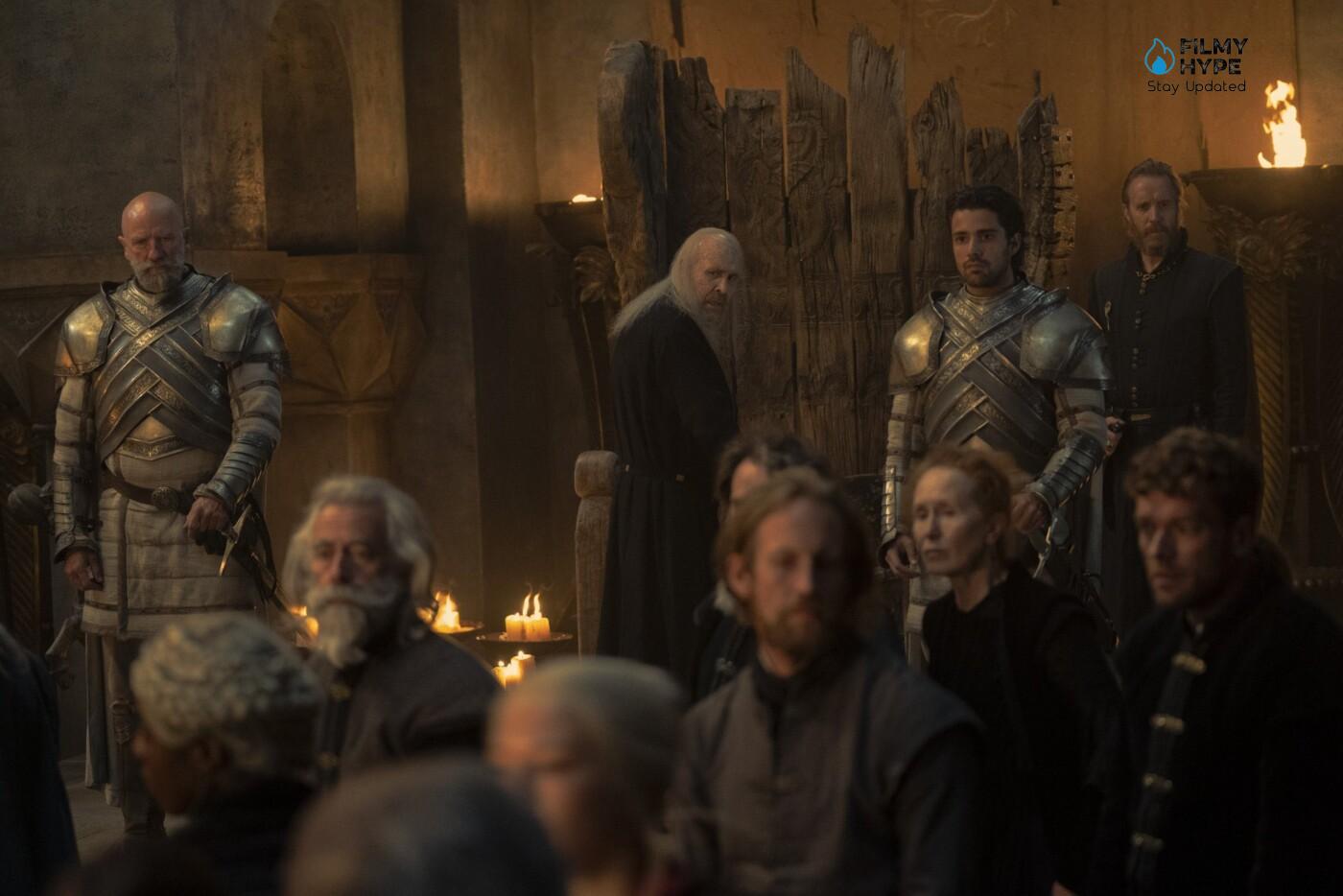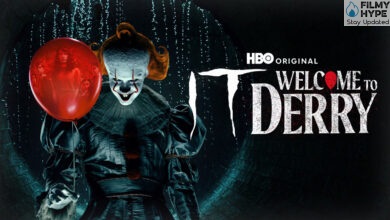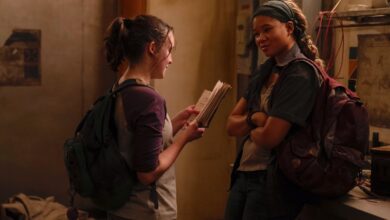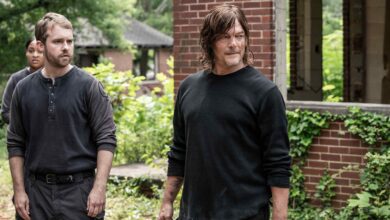House of the Dragon Episode 7 Review: Reaches Increasingly Surprising Qualitative Heights
Episode Title: Driftmark
Cast: Paddy Considine, Emma D’Arcy, Matt Smith, Olivia Cooke
Director: Miguel Sapochnik
Streaming Platform: HBO Max
Filmyhype.com Ratings: 4/5 (four stars)
Whether it’s weddings, funerals or social events, the tradition of HBO shows set in the world of George RR Martin’s works has now entered the collective imagination as synonymous with great surprises. In this sense, House of the Dragon has already left its mark on more than one occasion: after the climax reached in the sumptuous mid-season finale (here is our review of House of the Dragon Episode 5), the show created by Ryan Condal and by the famous fantasy writer, currently airing on HBO Max, he managed to raise the bar again by changing practically half of his cast (here our review of House of the Dragon Episode 6).

By overturning the concept of “team that wins, you don’t change” in the best possible way, the showrunner and executive producers, led by the brilliant director Miguel Sapochnik, brought to the screen a very mature evolution of the developments presented in the first five episodes of the series. In terms of writing and acting interpretations, the Game of Thrones spin-off seems genuinely intent on surpassing the mother’s work in almost every aspect, supported by an increasingly complex and intricate story that can’t wait to explode into everything. its chaos. Let’s analyze the seventh episode together. Not bad. Because, as we will see in our review of House of the Dragon Episode 7, this Driftmark still offers an hour of compelling and well-built television, thanks above all to a direction (the last, apparently, in this narrative universe) by Miguel Sapochnik refined and precious.
House of the Dragon Episode 7 Review: The Story
It is difficult to tell the plot of this seventh episode of House of the Dragon without spoilers. It is, in fact, an episode that is more attentive to the storytelling methods than to the actual events, which are not lacking and indeed, literally fly the 59 minutes that make up the episode. It is the day of the funeral ceremony of Lady Laena, the second wife of Daemon Targaryen (Matt Smith) who committed suicide in the last episode. All the main protagonists are gathered at Driftmark, the island home to the house of Velaryon. The ceremony will be an opportunity to resolve some issues that have been pending for too long. Or to detonate new ones.
Starting with the day and focusing on the events of one night, Driftmark marks a major break in the narrative of House of the Dragon, starting what looks like an explosive last act of a season that has told a lot, but always seems to struggle to leave. This time, however, it is impossible to think that the narrative revolution in progress is not to be considered a point of no return and who knows if, after having carefully sharpened the blades, now the time has not come to sink them.
After the shocking ending sequences of the last episode, the entire Targaryen family (with cadet houses in tow) find themselves dealing with their losses. Alta Marea mourns the disappearance of one of her daughters, but the solemn atmosphere of the funeral celebration is soon supplanted by the gloomy wind of the conflict. The mere fact that all the important characters are present at the event is too tempting an opportunity to be missed. Here then emerge intrigues, witty deceptions, accusations, and upheavals that will definitively mark the fate of the extended family. In a strenuous attempt to maintain lasting peace, King Viserys (Paddy Considine) will have to deal with a never-so-vindictive wife, now backed up by his father, and with a daughter increasingly vulnerable to the queen’s aims.
The only solution to curb the hatred and resentment of the Greens now seems to be that of a strenuous defense. To do this, however, it will be necessary to take a risky and difficult decision: to bring all possible allies closer to him, keeping only the most loyal people at his side, Rhaenyra (Emma D’Arcy) will resort to extreme measures to protect his position on the throne and the future of his children. It is no coincidence that, precisely in the moment of greatest weakness, the two protagonists of the conflict (albeit for opposing reasons) simultaneously find favor from their offspring and support from their mentors. Only the poor King, now increasingly tormented and battered, recognizes himself as a stranger and alone in a war that seems ready to break out in all his violence. The sides are increasingly clear, allies and opponents alike: Blacks and Greens are ready to do battle.
House of the Dragon Episode 7 Review and Analysis
As already noted on several occasions since the beginning of the series, in Westeros where Martin himself is more than just a choir voice there is a completely different air. If the flagship episodes of Game of Thrones (directed by Miguel Sapochnik) had offered memorable moments in the history of TV, the presence of the best director on the small screen behind the creative department of the show has proved a guarantee in terms of quality. The detachment between his gaze and that of his colleagues is still very evident, and this episode is also proof of this. If in the previous episode the director and executive producer had shown all his mastery in “bringing in the scene”, here his attention is concentrated almost entirely on the atmosphere.
Every dialogue, every exchange between the characters is a test of formal perfection, optimized according to the context of the events: the scenes during the funeral, with their continuous fields and counter-fields, feed a crescendo that culminates in a nocturnal sequence similar in atmosphere to the enveloping fourth episode. Similarly, the digital sequences find in Dolly’s movements an unparalleled breath and airiness, almost leading to self-arousal in showing the Dragons in all their magnificence. The director’s entire imaginative management, fully supported by the screenplay, brings to the spectator’s eyes a perpetual alternation between aesthetic splendor and narrative tension, maintaining constant attention and the rhythm of the events without any failure.
In this sense, the interpretations of the cast return to steal the show in an episode that places dialogues at the center of the scene: we had long awaited the first exchange between the “new” Rhaenyra and Matt Smith’s charismatic Daemon, and Emma D’Arcy also did not disappoint. The alchemy between the two is evident in every single glance, and the idea of seeing the duo more often on screen can only create great expectations regarding the events to follow. At the same time, Olivia Cook is sublime in portraying an increasingly conflicted character like the adult Alicent. The return, already known, of Rhys Ifans’ Eight Hightower brings back to the screen everything that fans have been waiting for: the characterization of the old, now new Hand of the King amazed everyone in its highlighting an extremely witty, calculating and ready character. to action in full GOT style.
Where fire makes fortune and ruin, only blood can bridge the gap between fear and tenacity. Seeing the numerous meanings behind Martin’s work emerge, episode after episode is stimulating beyond all measure and allows you to observe every single scene in detail to grasp details, intentions, or meanings higher than the simple surface. Ramin Djawadi’s music, much more inspired than the first episodes, creates an enveloping combination that keeps you glued to the screen from start to finish. In its siphoning action to leave room for far more impactful intrigues, House of the Dragon confirms the absolute quality of Condal and Martin’s work in renewing dynamics so dear to fans by making full use of the material available. In the current television landscape, it is extremely rare to find products that can constantly maintain themselves on similar qualitative peaks, enhancing every moment and raising the bar every week. HBO now has a clear path to enormous success.
We still have no idea how the events related to the Dance of the Dragons will develop over the course of the show but judging from what we are seeing we can expect an ever-increasing crescendo just three episodes from the end of this first season. House of the Dragon, in every area of its production, fully represents everything a high-budget adaptation should be. The banners of a memorable war stand out on the horizon. Not just directing and writing. In an episode in which at the center there are relational dynamics and a change of status quo, the weight of the story largely bears the cast. After seven episodes we can say that in House of the Dragon the actors on stage do not disappoint, always being convincing and in part, far from the risk of becoming stereotypes in costume.
It is striking how the young actresses and young actors, who give life to the next generation of Targaryen, have already managed to characterize themselves to the fullest, each with their personality and without giving in to heavy acting. We had no doubts about the talent of Emma D’Arcy and Olivia Cooke and, after the presentation of the last episode, in Driftmark the two have the opportunity to raise the stakes, giving life to the first real conflict of the season. Rhaenyra and Alicent are now women, their more angular and hard faces contain anger and desire, the consequence of a male world that has shaped them. This justifies for the first time the relay between the two actresses and the previous Milly Alcock and Emily Carey.
Targaryen and Velaryon. The house of fire and that of water. In the marriage (combined and facade, of course) between Rhaenyra (Emma D’Arcy) and Laenor, we find the conflict of the series itself. It is Rhaenyra herself, in a dialogue with her uncle Daemon, who notices the differences between the flames that imprison and the sea that allows escape routes. House of the Dragon with these two elements has given life to a conflictual marriage, between the desire to break away from the mother series to build a narrative of its own and the need to address an audience of fans who had loved The Throne of Swords of the first seasons. The starting story, however, is all too intimate and downsized compared to the epic scope of the previous series. The result is a work that tries to replicate its most memorable aspects,
In this regard, it would be enough to listen to the soundtrack by Ramin Djawadi, all too derivative of his previous work, and which – unlike photography, with that refinement of natural light that frescoes the imaginary world of Westeros and characterizes it – prevents the series from building a real separate identity. That is a history of conflict between generations, and with children trying to break the laws of their fathers, it would be appropriate. The feeling that remains (and which we hope will be forgotten with the last three episodes) is that House of the Dragon is on the back of a heavy dragon, which takes flight. And that he needs to dominate before he can enjoy the view and the breeze on him.
House of the Dragon Episode 7 Review: The Last Words
The seventh episode of House of the Dragon marks the decisive step for the continuation of the series towards its first season finale. Supported by the incredible direction of Miguel Sapochnik and the splendid interpretations of its cast, the HBO show seems ready to leave its mark with a conflict that feeds on episode after episode, feeding on the resentment and tension around the characters. The Dance of the Dragons, less and less latent, is already here. The seventh episode of House of the Dragon Episode 7 offers an hour of television in which the direction of Miguel Sapochnik stands out, able to tell the many events and tensions of the characters with nocturnal images. The cast works well and the curiosity for the latest episodes is great, but the series now also needs to take flight and build a more precise identity instead of replicating the dynamics and style of Game of Thrones.







